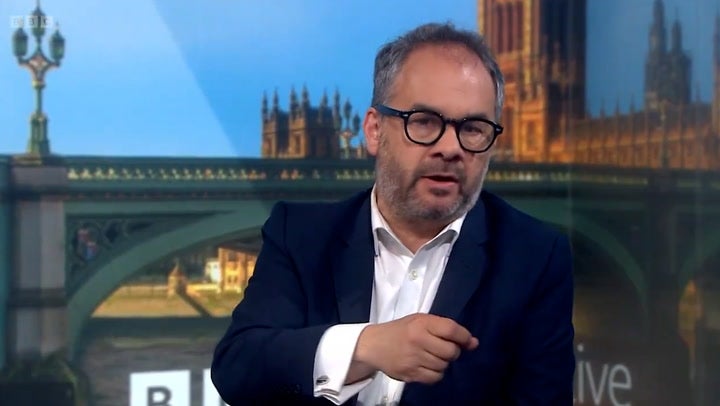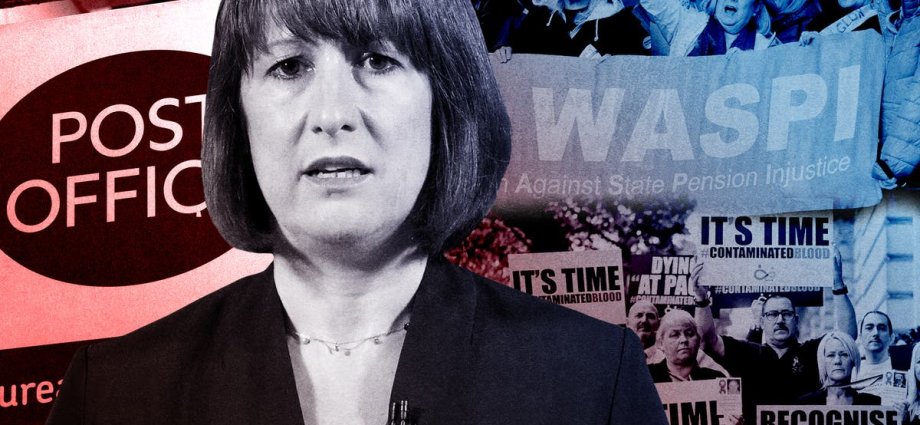The efforts of the chancellor Rachel Reeves to get control of Britain’s finances are being hampered by a massive £47bn bill in outstanding compensation claims which could balloon even further, The Independent can reveal.
Analysis of a report by the National Audit Office (NAO) showed £84bn has been pledged by previous governments, with 12 compensation schemes for injustice, cover-ups and negligence.
Although much of that sum has been paid out by the British state, almost £47bn is still owed in high-profile cases such as the infected blood and Post Office Horizon scandals.
The outstanding total is more than double the £22bn black hole in the nation’s finances that the chancellor revealed to MPs in July which saw her slash winter fuel payments, cancel reforms to social care and cut spending plans including upgrades to the railway network.
Ms Reeves has also confirmed that she intends to roll back on her election pledge not to raise taxes.
But, alarmingly for the government, the bill could grow even higher. Infected blood scandal victims are expecting more than the £2.2bn currently in the budget to compensate them, while other demands for compensation are still to be decided.

Compensation for around 3 million Waspi (Women Against State Pension Inequality) women whose retirement plans were hit by changes in the pension age, worth between £1,000 and £2,950 each, has not been included in the figures. There is also pressure for a proper compensation scheme for the British nuclear test veterans, with 1,500 still believed to be alive.
While several compensation schemes have now been closed, many of them are still open with no end date identified. Pressure has piled on in recent months for those payments to be made.
Former Post Office minister Paul Scully, who oversaw compensation for postmasters, told The Independent that the gigantic bill to the taxpayer is often “the consequence of groupthink and cover-up to protect the brand”.
He said: “If the cover-up did not happen and the mistakes were dealt with earlier, the cost would be far lower to the public purse.”
He added: “I came across many horrendous cases [in the Post Office scandal]. Nothing can properly compensate the way lives were ruined and businesses bankrupted by this scandal but we have a duty to compensate the victims as best we can.”
He said the budgeted amounts were based on value-for-money tests by the Treasury to protect the taxpayer in the future.
The new government is planning to introduce a duty of candour for public employees to try to prevent cover-ups.
It follows outrage over the behaviour of the Post Office under former boss Paula Vennells, which led to subpostmasters being wrongly convicted and jailed for theft, fraud and false accounting.

The NAO report found that £222m has been paid out so far from a potential budget of £1bn for the Post Office, according to the analysis by the Taxpayers’ Alliance.
The compensation bill included the infected blood scandal where more than 30,000 people in the UK were infected with HIV and hepatitis C after being given contaminated blood products in the 1970s and 1980s. Successive governments ignored warnings about the blood supplies, allowing victims to be infected. Among those severely criticised by a public inquiry was former health secretary Kenneth Clarke.
So far, £346m out of the £2.2bn budgeted for interim payments has been paid – but campaigners say the cost should be more.
Former SNP MP Chris Stephens, who worked closely with the victims and their families, said the actual compensation cost was always understood to be at least £10bn.
He said: “The infected blood community deserve clarity on these figures. Either the £10bn figure is accurate and the previous government didn’t account for the funds or the £10bn was used as political leverage to scare people as to the cost.
“The government needs to ensure that the commitments parliament has given the infected blood community are met. In full.”
However, the NAO has warned that there is a lack of coordination in how compensation schemes are decided and handled by the government, leading to mistakes.

The report noted: “Citizens eligible for redress will have suffered hardship and distress. These citizens have a reasonable expectation that their claim will be treated fairly and speedily. There is no central coordinated approach when the government sets up new compensation schemes resulting in a relatively slow, ad hoc approach.
“Setting up and administering a compensation scheme is a complex task, and challenging for officials who may have never done it before. This has led to mistakes and inefficiencies in the design of schemes, and delays in getting money to claimants.
“Claimant and stakeholder confidence can be further undermined where the design and operation of the scheme is not seen as being independent from those who have caused them harm. Those with experience of schemes all agree that: redress should be swift; decisions fair, proportionate and transparent; and that those harmed should be at the heart of decision making.”
The largest amount the taxpayer has to fund is for clinical negligence schemes managed by NHS Resolution, where £26.5bn has been paid out and a further £69.3bn budgeted for.
Other schemes have an unknown ceiling for payments, including the vaccine damage scheme from the late 1970s, with £20m paid out so far.
The payments for the Windrush scandal – which saw people entitled to live in the UK wrongly deported – have so far reached £85.9m from a budgeted amount of £215m.
Another open scheme is the armed forces compensation scheme (AFCS) which pays out for injury, illness or death caused by service on or after 6 April 2005. So far, £1.3bn has been paid out from a total of £2.3bn budgeted.
Schemes fully paid up include compensation for coal miners (£4.3bn), foot and mouth (£1.3bn), and the Icelandic water trawlermen from the 1970s cod wars (£43m).
A Treasury source said that details on the expected costs of compensation schemes will be set out in the autumn Budget “as required in the usual way”.
The government has stated that it is committed to paying comprehensive compensation to infected and affected victims of the infected blood scandal. But it admits that it does not yet know how much needs to be set aside.
The Treasury has noted that the total cost of the compensation scheme will ultimately depend on the number of people who have been infected or affected who come forward, but “each eligible person will get the compensation they are due”.
John O’Connell, chief executive of the TaxPayers’ Alliance, which collated the figures, said: “Taxpayers will be utterly appalled by the vast bill they’ve been left with as a result of this catalogue of cock-ups by previous governments.
“When things go badly wrong, those impacted are right to expect and indeed demand compensation, but what is inexcusable is that these mistakes are by no means once in a blue moon.
“The new government can demonstrate that they represent a change by resolving existing schemes quickly and efficiently while ensuring these sorts of errors are a thing of the past.”











